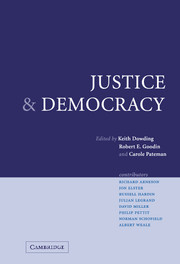Book contents
- Frontmatter
- Contents
- List of figures
- List of contributors
- 1 Introduction: between justice and democracy
- 2 Are democratic and just institutions the same?
- 3 Democracy is not intrinsically just
- 4 ‘The probability of a fit choice’: American political history and voting theory
- 5 Contractarian theory, deliberative democracy and general agreement
- 6 Democracy, justice and impartiality
- 7 Mimicking impartiality
- 8 Justice, democracy and public goods
- 9 The common good
- 10 Individual choice and social exclusion
- 11 Subnational groups and globalization
- References
- Brian Barry's publications
- Index
4 - ‘The probability of a fit choice’: American political history and voting theory
Published online by Cambridge University Press: 22 September 2009
- Frontmatter
- Contents
- List of figures
- List of contributors
- 1 Introduction: between justice and democracy
- 2 Are democratic and just institutions the same?
- 3 Democracy is not intrinsically just
- 4 ‘The probability of a fit choice’: American political history and voting theory
- 5 Contractarian theory, deliberative democracy and general agreement
- 6 Democracy, justice and impartiality
- 7 Mimicking impartiality
- 8 Justice, democracy and public goods
- 9 The common good
- 10 Individual choice and social exclusion
- 11 Subnational groups and globalization
- References
- Brian Barry's publications
- Index
Summary
Madison, Condorcet and the ratification of the constitution in 1787–1788
[I]t may be concluded that a pure democracy, by which I mean a society, consisting of a small number of citizens, who assemble and administer the government in person, can admit of no cure for the mischiefs of faction … Hence it is that democracies have been spectacles of turbulence and contention; have ever been found incompatible with personal security … and have in general been as short in their lives as they have been violent in their deaths.
A republic, by which I mean a government in which the scheme of representation takes place, opens a different prospect …
[I]f the proportion of fit characters be not less in the large than in the small republic, the former will present a greater option, and consequently a greater probability of a fit choice.
(Madison in Rakove 1999)This argument in Federalist 10, written in November 1787 by James Madison, may still be relevant today. However, modern theories of democracy have not constructed formal models of voting able to develop Madison's distinction between pure democracy and the republic (or what we call representative democracy). My intention in this chapter is to present a model that can be used to interpret certain aspects of American political history in order to gauge the validity of Madison's argument.
The theoretical problem that Madison addressed in Federalist 10 was the generally accepted belief that democracy was unstable.
- Type
- Chapter
- Information
- Justice and DemocracyEssays for Brian Barry, pp. 59 - 78Publisher: Cambridge University PressPrint publication year: 2004



